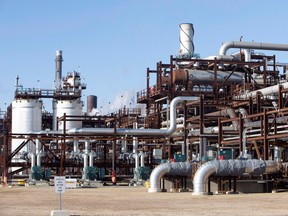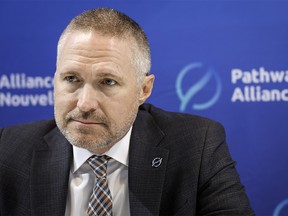
Alberta Premier Danielle Smith will head to the COP28 conference in Dubai this week and then travel in the Middle East with a pivotal new climate policy in hand: a carbon capture incentive program that could attract up to $35 billion in investment.
On Tuesday, the province will announce details of Smith’s trip to the region, including later stops in Doha, Qatar, and potentially Saudi Arabia’s capital of Riyadh, as the COP28 climate summit begins Thursday.
The province will also release details Tuesday of Alberta’s long-awaited carbon capture, utilization and storage (CCUS) program, which is seen as a lynchpin to unlocking billions of dollars in investment from a number of key industrial sectors.
The new program will provide project developers with an expected 12 per cent grant on eligible capital costs to build such facilities, which capture carbon emissions and store them underground.
Provincial grants will be paid out over three years, but only once a project is operating.
The program is expected to cost between $3.2 billion to $5.3 billion by 2035, depending on the number of projects. In turn, the government estimates such developments will generate about $35 billion in capital investment across the province during that period, creating up to 21,000 jobs.
“We are going to make some real headway in helping people to understand how committed we are to reaching a 2050 carbon neutral target and doing it with the help of the industry and technology,” Smith said in an interview.
“But while we’re in the region, we want to try to touch base with representatives from Abu Dhabi and Doha and Riyadh … I want to start exploring the ways in which they might want to invest in Alberta.”
-
 Premier Danielle Smith flying to COP28 climate conference to talk up Alberta’s fossil fuel-friendly plan
Premier Danielle Smith flying to COP28 climate conference to talk up Alberta’s fossil fuel-friendly plan -
 United Church of Canada giving populations most affected by climate change a voice at COP28
United Church of Canada giving populations most affected by climate change a voice at COP28 -
 Pathways Alliance increasingly confident $16.5B carbon capture project will go ahead
Pathways Alliance increasingly confident $16.5B carbon capture project will go ahead -
 Varcoe: Alberta energy firms ‘encouraged’ by new federal incentives for carbon capture and storage
Varcoe: Alberta energy firms ‘encouraged’ by new federal incentives for carbon capture and storage -
 Alberta minister decries ‘delays’ on carbon capture tax credits following federal economic statement
Alberta minister decries ‘delays’ on carbon capture tax credits following federal economic statement -
 Varcoe: ‘Small price to pay’ — Premier says CCUS incentives under development, could be worth nearly $2B for oilsands
Varcoe: ‘Small price to pay’ — Premier says CCUS incentives under development, could be worth nearly $2B for oilsands
Carbon capture is seen as a central element in Alberta’s strategy to reach net-zero emissions by 2050 as industries such as oil and gas, power generation and petrochemicals seek to decarbonize while climate concerns grow.
The oil and gas sector is the largest emitting sector in the country, although a number of CCUS projects have been proposed across the industry, including in the oilsands.
Alberta Energy Minister Brian Jean said the province has the geology to develop numerous underground storage hubs, along with experience operating carbon capture projects.
Part of the funding for the new program is expected to come from the province’s Technology Innovation and Emissions Reduction (TIER) program. Further program details are anticipated to be released next spring.
“Alberta is not (in) for a penny until the investment is made … If nothing is spent by these companies or by the federal government, then nothing is spent by the people of Alberta,” Jean said.
“The world is looking for opportunities like this to store their carbon and we’re able to do it right underneath in our basement.”
The announcement comes a few days after Ottawa vowed to introduce legislation on a federal investment tax credit for CCUS projects — worth up to 50 per cent — in the coming weeks.
It has also pledged to establish carbon contracts for difference, which are designed to backstop the future price of carbon.
“It’s important for the federal and provincial government to stand together on this issue and say that we intend to be leaders in this technology attraction,” Smith added.
“If it’s going to cost $3 to $5 billion to secure our place so that we have that steady stream of royalties and production for 30 or 40 years, I think that most Albertans will see that’s a pretty fair investment.”
Federal Natural Resources Minister Jonathan Wilkinson said CCUS isn’t a silver bullet to solve the challenges on climate, but it has an important role to play — and there’s a reason for governments to provide assistance.
“I would say there is an important public policy imperative for us to be working aggressively with industry to reduce carbon emissions,” Wilkinson said in an interview.
However, a report last week by the International Energy Agency warned against “excessive expectations and reliance” on carbon capture.
It said CCUS is an “essential technology for achieving net zero emissions in certain sectors and circumstances, but it is not a way to retain the status quo.”

The report pointed out that about 45 megatonnes of CO2 annually is being captured through CCUS projects in 11 countries, including Canada.
While many projects have been announced, only five per cent have made a positive final investment decision, the IEA noted.
The idea of providing incentives to the oil and gas industry will face some opposition, with environmental groups noting recently the sector has recently recorded large profits.
In Alberta, the Pathways Alliance group of six oilsands producers has spent $1.8 billion on decarbonization projects and plans to spend about $16.5 billion on the first phase of its foundational carbon capture and storage network.
The group said in a news release Monday it expects to make regulatory applications on its CCUS project imminently, although a final investment decision would still be required.
“We’re not sitting around waiting,” said Pathways Alliance president Kendall Dilling. “We are working as hard as we possibly can to keep this project on track and keep all these technologies advancing.”

With the federal and provincial programs now in place, Smith expects proposed CCUS projects in Alberta will start to move forward.
“I’d like them to start announcing that they’re making final investment decisions now that this last piece is in place,” she added.
As for COP28, more than 100 delegates from Alberta — including officials from Pathways Alliance members, Capital Power, Enbridge and Nutrien — will be heading over to the international climate meeting.
For Smith, the trip will also include meeting with officials from Dubai, Abu Dhabi, Doha and Riyadh to talk about investment opportunities.
In Doha, Qatar, Smith will meet with the CEO of QatarEnergy and officials with the country’s sovereign wealth fund.
Smith said she expects to talk in Dubai with Saudi Arabia’s energy minister, Prince Abdulaziz bin Salman, although a separate trip to the kingdom could also take place.
Chris Varcoe is a Calgary Herald columnist.
You can read more of the news on source






